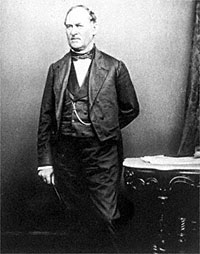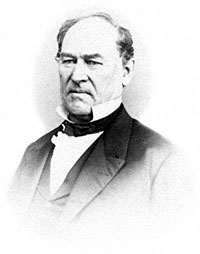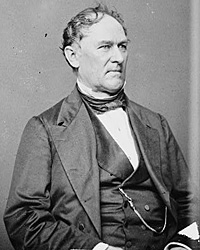Senator from Illinois (Republican, 1861-62), Orville Hickman Browning was appointed by Governor Richard Yates to succeed Stephen Douglas on his death in June 1861, thus infuriating Illinois Democrats. A personal and political friend of President Lincoln, Browning was a frequent visitor to the White House, discussing political and military affairs as well as reading poetry. Browning and the President often went on rides together. Sometimes, he attended church with the Lincolns and returned with them to the White House for Sunday lunch. During his short term, he often seemed to serve as the President’s spokesman in the Senate.
Browning had unsuccessfully sought appointment to the Supreme Court in 1861; David Davis got the appointment to a third Court vacancy in August 1862. Browning’s wife herself wrote the President on June 8, 1861 to urge the appointment of her husband because “I know my husband to be one of the wisest, best men in the Nation.”1 Browning himself wrote Mr. Lincoln on April 9, 1861: “You know me about as well as I know myself; and in regard to my fitness for the office you know me better—for you occupy a far better stand point for the formation of a fair and impartial judgment than I do….I say frankly, and without any sort of disguise or affectation, that there is nothing in your power to do for me which would gratify me so much as this. It is an office peculiarly adapted to my tastes, and the faithful and honest performance of the duties of which would be my highest pride and ambition.”2
Davis also had strong Illinois advocates for the Supreme Court, including Leonard Swett, who wrote his wife in August 1862: “A few nights before I left [Washington] I called upon Mrs. Lincoln. She told me she had been fighting Davis’s battles, that Browning had gone home, & she was glad of it—that he became distressingly loving just before he left. She told me to tell Judge Davis that his matter was all right. She seemed very glad and very positive of it. When I left, she told me again at the door to tell Judge Davis his matter was all right.”3 Swett himself later wrote:
Mr. Browning had the advantage that Lincoln was new in his seat, and Senators were August personages; and, being in the senate and a most courteous and able gentleman, Mr. Browning succeeded in securing nearly all the senatorial strength; and Mr. Lincoln was nearly swept off his feet by the current of influence. Davis’ supporters were the circuit lawyers mainly in the eastern and central part of the State. These lawyers were at home, and their presence was not a living force felt constantly by the President at Washington.” 4
Swett’s own influence must have been considerable because he himself heard that the President had declared: “I do not know what I may do when the time comes, but there has never been a day when if I had to act I should not have appointed Browning.” Swett believed the remark authentic and determined to make one more effort to persuade President Lincoln. He went to Washington and reminded Mr. Lincoln of his political debts to Davis.5
Historian David H. Donald wrote: “Lincoln was obviously delighted to have the Brownings in Washington, old friends whom he could absolutely trust. He knew that the Illinois senator would never betray a confidence, never leak information to his colleagues or to the press, never even hint that he had inside information.”6 Lincoln historian Matthew Pinsker noted that “ they reconnected in Washington during the winter of 1861-1862. Only in that season of private grief and national tragedy did Lincoln and Browning draw closer together.”7
Both Brownings remained at the White House with Willie’s body the night after the Lincoln’s third son died in February 1862. Sen. Browning took care of funeral arrangements for Willie Lincoln. Browning opposed emancipation and was defeated in 1862 Democratic sweep in Illinois. About a month after Browning’s defeat that November, President Lincoln was beset by Republican senators upset about his war and political policies. “What do these men want? They wish to get rid of me, and I am sometimes half disposed to gratify them,” complained the President about Republican Radicals.8
After seeing President Lincoln on July 15, 1862, Browning wrote: “He looked weary, care-worn and troubled. He held me by the hand, pressed it, and said in a very tender and touching tone – ‘Browning I must die sometime.’”9 Maurice Baxter observed: “In these summer months of 1861 Browning was a frequent visitor at the White House. Developing his long friendship with Lincoln to the point of becoming an intimate confidant, he often made informal calls on the President, who seemed to welcome such breaks in a routine of wearisome tasks.”10
Browning’s reelection in 1862 was threatened by a split among Illinois Republicans because of Browning’s opposition to emancipation and strong confiscation measures. Biographer Maurice Baxter wrote: “While the canvass was being conducted, Browning continued to correspond with Lincoln. He wrote about his speaking appearances and about popular reaction to them. Only a small number of Radicals and secessionist Democrats opposed the administration, Browning reported, while a majority of the people relied upon Lincoln to refuse to arm the Negroes or to resort to other measures which would irritate the loyal border states. Browning’s only worry was that Lincoln might despair. Each letter carried a vigorous note of encouragement.” His support of the President dissipated as the election approached. Baxter wrote: “On November 3 he delivered an address at Concert Hall in Quincy, but he was too noncommittal for the Quincy Whig, which complained that he advised his audience to vote the best ticket without telling them which ticket was the best one.”11
When Browning lost his Senate seat in the 1862 elections, he was pushed forward as a candidate to succeed Caleb Smith as Secretary of the Interior. On December 14, 1862, Browning recorded in his diary: “Mrs Lincoln sent her carriage this morning for me to go to Church with her which I did. The President did not go. After Church she rode with me to Capitol Hill. On our way down she told me the President was anxious to get Secretary Smith out of the Cabinet, and me in his place. That he was anxious to have Mrs Browning and myself in Washington, and the only thing that would prevent him offering me the place would be the fear of having it said he was giving everything to Illinois, but she thought he would do it—She knew he wished to.”12 Biographer Maurice G. Baxter noted: “On December 24 [1862] Postmaster General Montgomery Blair congratulated Browning and insisted it was settled that he would be appointed secretary of the interior. Browning rather weakly replied that he could not take it if he were chosen. But Lincoln did not at any time actually offer Browning the secretaryship, nor is there conclusive proof that he intended to do so.”13
After his Senate defeat, noted Matthew Pinsker, Browning “remained in Washington as a lobbyist but never again enjoyed the regular social intercourse with the president that he had during the previous year. Lincoln avoided him on January 1, the day of the proclamation’s signing, for example, when Browning showed up at the White House to share an afternoon carriage ride out to the Soldiers’ Home.”14
Senator Browning continued to be a trusted confidante during the period—which included the attempt by Radical Senators to oust William H. Seward and reorganize the Cabinet in the wake of the Union defeat at Fredericksburg. On December 1862, Browning recorded in his diary that Mr. Lincoln complained: “They wish to get rid of me, and I am sometimes half disposed to gratify them…We are now on the brink of destruction. It appears to me the Almighty is against us, and I can hardly see a ray of hope.” The President complained of the effort to remove Seward: “Why will men believe a lie, an absurd lie, that could not impose upon a child, and cling to it and repeat it in defiance of all evidence to the contrary.” Mr. Lincoln was more hopeful the next day, saying to Browning that he was trying to “keep things along.”15 Over the next several days, he continued to talk with the President and helped to keep Seward in the Cabinet. By December 22, Browning wrote in his diary that he told Mr. Lincoln that the Radical senators’ “game was to drive all the cabinet out—then force upon him the recall of Mr [Salmon P. Chase] as Premier, and form a cabinet of ultra men around him. [Mr. Lincoln] said with a good deal of emphasis that he was master, and they should not do that.”16
Although a trusted friend who presumed upon the friendship for favors and patronage, Browning doubted Lincoln’s leadership abilities as President and supported Edward Bates for the Republican nomination in 1860. (Lincoln himself voted against Browning for State’s Attorney in the first legislative session in which he served.) After he lost 1862 election, Browning opened a successful law firm. He also tried to be cotton broker and get trading permits for friends — which President Lincoln permitted but General Ulysses S. Grant and Secretary of War Edwin M. Stanton effectively blocked in late 1864 and early 1865. Browning used his friendship with the President to press his patronage and pardon requests. Among the beneficiaries of his pressure was the President’s own brother-in-law, Ninian Edwards, husband of Elizabeth Todd Edwards.
Browning’s loyalty to Lincoln, however, was questionable – especially in the election of 1864. “He refused to come out definitely in favor of either nominee, because, he said, he had not talked as a politician since the beginning of hostilities at Sumter,” wrote biographer Maurice Baxter. “Browning was indeed in doubt as to which candidate was preferable for the presidency.” He wrote Edgar Cowan: “You know, strange as it may seem to you, that I am personally attached to the President, and have faithfully tried to uphold him, and make him respectable; tho’ I never been to persuade myself that he was big enough for his position. Still, I thought he might get through, as many a boy through college, without disgrace, and without knowledge; and I fear he is a failure.”17
His diary has become an important source of information about Mr. Lincoln’s White House. One controversial entry from July 3, 1861 suggested that President Lincoln had manipulated the situation in Fort Sumter to put the onus of the war on the secessionists. Browning wrote:
He told me that the very first thing placed in his hands after his inauguration was a letter from Majr Anderson announcing the impossibility of defending or relieving Sumter. That he called the Cabinet together, and consulted Genl. Scot—that Scott concurred with Anderson, and the cabinet, with the exception of himself and P M Genl. Blair were for evacuating the Fort, and that all the troubles and anxieties of his life had not equally those which intervened between this time and the fall of Sumter. He himself conceived the idea, and proposed sending supplies, without an attempt to reinforce giving notice of the fact to Gov Pickins of S.C. The plan succeeded. They attacked Sumter—it fell, and thus, did more service than it otherwise could.18
Browning’s “manner provoked attention. Though conservative, he was not reticent; though proper, not retiring. His movements were both and self-assured; he was not one to recede into the background of spectators. Whatever part he took in affairs, he wanted it to be a prominent one, not trivial or obscure,” wrote biographer Baxter.19 Often conventional and sometimes arrogant, Browning’s personality contrasted with that of Mr. Lincoln. Nevertheless, Browning exemplified the multiple pressures of visitors to the White House. He was a prolific letter writer, a seeker of patronage and favors, a giver of solicited and unsolicited advice, an elected official, a supporter and an opponent, and a seeker of judicial appointment. He also represented the contradictory opinions of Mr. Lincoln’s advisors. Early in the war, Browning was a militant and supported General John C. Fremont’s order freeing slaves in Missouri, writing the President in September 1861: “There has been too much tenderness toward traitors and rebels. Later in the Senate, he opposed tough congressional action against Southern slave owners and argued that tough actions were solely an executive power. However, when President Lincoln himself issued the Emancipation Proclamation, Browning opposed it. He also worried about military abuses of civil liberties. In 1864, he even wavered on supported the President for reelection, writing a friend:
You know, strange as it may seem to you, that I am personally attached to the President, and have faithfully tried to uphold him, and make him respectable; tho’ I never have been able to persuade myself that he was big enough for his position. Still, I thought he might get through, as many a boy through college, without disgrace, and without knowledge; and I fear he is a failure.20
Browning was stuffier, more conventional, more proper, and more dignified than his long-time friend. He was also, as biographer Maurice Baxter observed, more conceited. President Lincoln’s literary obsessions were probably more appreciated by Browning that by some members of his Cabinet. Historian Allen C. Guelzo wrote: “When he found that Orville Hickman Browning had never read Hood’s ‘The Haunted House,’ Lincoln ‘rang his bell — sent for Hood’s poems and read the whole of it to me, pausing occasionally to comment on passages which struck him as particularly felicitous.’ (On the other hand, Lincoln remained too much the rationalist to have much relish for the arch-sentimentalist among American poets, Henry Wadsworth Longfellow; characteristically, he liked only Longfellow’s hackneyed paean to duty, ‘A Psalm of Life,’ and his anticlerical satire, ‘The Birds of Killingworth.’)”21
Browning first served with Lincoln in 1837 in the Illinois Legislature where he served for seven years; he was defeated by Stephen A. Douglas for Congress in 1852. Later, he served as Interior Secretary (1866-69) under President Andrew Johnson, whom he supported during impeachment and served briefly as Attorney General. Browning’s wife, Eliza was one of Lincoln’s first upscale female friends.
Footnotes
- David Mearns, The Lincoln Papers, pp. 630-631.
- Maurice G. Baxter, Orville H. Browning: Lincoln’s Friend and Critic, p. 112.
- Willard L. King, Lincoln’s Manager: David Davis, p. 195.
- William H. Herndon and Jesse W. Weik, Life of Lincoln, p. 406.
- Herndon and Weik, Life of Lincoln, pp. 406-407.
- David Herbert Donald, “We Are Lincoln Men” Abraham Lincoln and His Friends, p. 114.
- Matthew Pinsker, Lincoln’s Sanctuary: Abraham Lincoln and the Soldier’s Home, p. 29.
- David Donald, Lincoln, p. 402.
- Theodore Pease, editor, Diary of Orville Hickman Browning, Volume I, p. 596.
- Baxter, Orville H. Browning: Lincoln’s Friend and Critic, pp. 147-148.
- Theodore Pease, editor, Diary of Orville Hickman Browning, Volume I, p. CHECk.
- Baxter, Orville H. Browning: Lincoln’s Friend and Critic, p. 152.
- David H. Donald, Lincoln, p. 402.
- Theodore Pease, editor, Diary of Orville Hickman Browning, Volume I, p. 596.
- Baxter, Orville H. Browning: Lincoln’s Friend and Critic,p. 111.
- Matthew Pinsker, Lincoln’s Sanctuary: Abraham Lincoln and the Soldier’s Home, p. 106.
- Pease, Diary of Orville Hickman Browning,Volume I, p. 600.
- Pease, Diary of Orville Hickman Browning,Volume I, p. 476.
- Baxter,Orville H. Browning: Lincoln’s Friend and Critic, p. 158.
- Baxter, Orville H. Browning: Lincoln’s Friend and Critic, p. 152.
- Allen C. Guelzo, Abraham Lincoln: Redeemer President, p. 315.
Visit
Mary Todd Lincoln
Leonard Swett
David Davis
Andrew Johnson
Elizabeth Todd Edwards
Stephen A. Douglas
John Palmer Usher
Biography
Biography (Link 2)
Browning Diary
Abraham Lincoln and Cotton
Orville H. Browning (Mr. Lincoln and Friends)
Supreme Court (Mr. Lincoln and Friends)
David Davis (Mr. Lincoln and Friends)
Eliza Caldwell Browning (Mr. Lincoln and Friends)
William H. Seward (Mr. Lincoln and Freedom)










